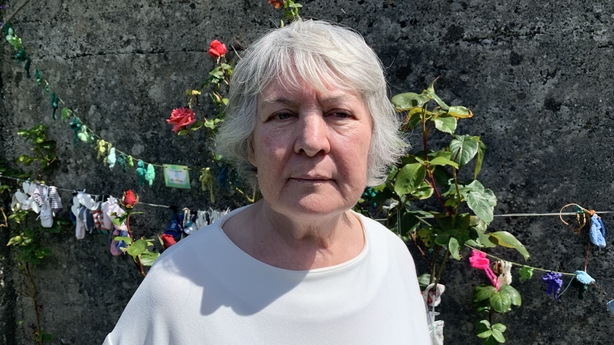Tuam historian Catherine Corless has described revelations about evidence given to a confidential committee as an "eye opener", which confirmed survivors' feelings were not considered by the Commission of Investigation into Mother and Baby Homes.
She said the process of giving testimony had been a "complete waste of survivors’ time".
Research conducted by Ms Corless was central to the Commission being established. But today she said the final report needed to be reviewed, to ensure that the views and evidence of survivors was fully included.
She said people had expected the process would help ascertain the truth, instead of it being an academic exercise.
Ms Corless said the Commission had been very careful in the material it selected for the final report.
She said she now hoped the Government would "get up off its backside" and finally provide the answers and supports that survivors need.
"This is going down in history and it’s a fallacy," she said.
The local historian said instead of the Investigation assisting the process of restitution, "it goes from bad to worse".
Today, Minister for Children Roderic O'Gorman said the members of the Commission of Investigation needed to "urgently clarify" the treatment of the personal accounts of survivors by coming before an Oireachtas committee.
'Delay tactics' holding up redress process

A survivor of the Tuam mother-and-baby home described the latest developments as devastating.
Carmel Larkin, who was fostered as a child from the home, said it was very hurtful to survivors to hear their stories had been ignored.
Ms Larkin detailed how she had prepared the testimony she provided to the confidential committee in advance. She then travelled to Dublin to outline her story, during a meeting with Judge Yvonne Murphy.
She said she was not informed in advance of what was expected of her and had now found out that the material she provided was not used.
Ms Larkin said it was her understanding that the interview was part of the investigative process of what went on in mother-and baby homes.
She said survivors had "been through enough" and needed to move on, instead of having to deal with what she called "delay tactics", that were holding up the redress process.
'Every time we tell our story, we have trauma'
Teresa O'Sullivan, who was born in a mother-and-baby home in 1957, said she was very disappointed about what has emerged.
She said she would have preferred if the commission had spoken about the report before now.
"One of the biggest things about the commission is transparency. It was about us, it was about families, it was about trauma, it was about memory loss and extreme neglect."
She added: "There would be no commission without survivors and that was very badly missed in this report. Every time we tell our story, we have trauma and that needs to be very strongly recognised."
Anne Harris, who gave birth to her son at Bessborough mother-and-baby home, said it was "insensitive" that Professor Daly broke her silence in the UK and in an academic setting.
"It was downgrading to hear this. With a thing that is so sensitive and associated with Ireland, Ireland is the place it should have been held."
Ms Harris said while it might have been unintentional that she chose to speak there first, she believes it "showed a lack of respect for the feelings" of those who gave evidence to the Commission of Investigation.
She said she went on the record when she gave evidence to an investigative committee as part of the investigation, but said despite being well received, there was no follow up afterwards.
"I gave a statement but never saw it again and only got the transcript after the report was published."
The commission has already been asked to go before the Oireachtas Committee on Children and answer questions about its work.
Dr Maeve O'Rourke, Director of Human Rights Law Clinic at the Irish Centre for Human Rights and Lecturer at NUI Galway, has called on the Government to repudiate the findings of the report.
Speaking on RTÉ's Today with Claire Byrne, Dr O'Rourke said the underlying archive must be opened to allow those who gave evidence, to have copies of what they said and to access to their full personal data.
She said: "We haven't seen practical movement from the Government on this yet.
"They have made promises for dedicated National Archives to 20th century institutional trauma. They have promised people their personal data but we have not seen action on that yet."
Activist and PRO for the Tuam Mother and Baby Home Alliance, Breeda Murphy, said she attended yesterday's seminar because she wanted to hear the rationale of the commissioners about the conclusions of the report, and in particular the executive summary where remarks were made that were particularly hurtful to survivors.
She said on RTÉ's Six One that what happened has underlined yet again the disrespect shown to survivors and to families of lost children. They had not been afforded the same opportunity and their testimonies, when given, were not provided to them to read back. Unlike the religious orders, she said, they had not been given a right of reply.
Ms Murphy said that once again, that after years of silence, testimonies bravely given had been disregarded.
She said that the Commission actually ran for almost six years, with a number of interim reports, and if this issue had been highlighted to the Government by members of the Commission, a way forward could have been found to deal with it.






